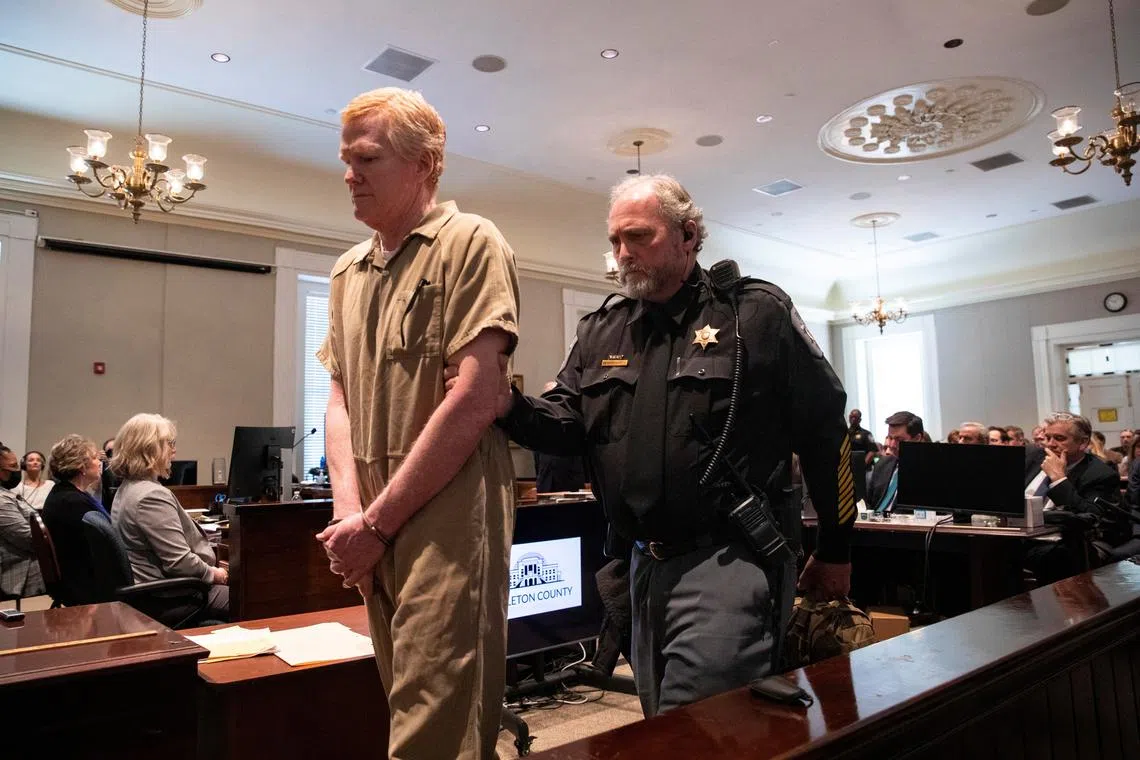Power, privilege and greed: How Alex Murdaugh’s life and crimes unravelled
Sign up now: Get ST's newsletters delivered to your inbox

Alex Murdaugh, once a prominent lawyer in South Carolina, was sentenced to life in prison for murdering his own wife and son.
PHOTO: REUTERS
Follow topic:
Alex Murdaugh, a fourth-generation lawyer in South Carolina, has been sentenced to life in prison for the murders of his wife and younger son in June 2021.
Who is he, and why does his case hold so much allure for true-crime-obsessed Americans?
His life’s path has been one that may as well be a plot for a gripping, sordid HBO series about how power and privilege in America can corrupt a man and mutilate his morals so thoroughly that shooting his own son and then his wife with a shotgun at close range leaves absolutely no trace of guilt or remorse.
His conviction is seen as a powerful rebuke to overbearing wealth, a declaration that no one in America, no matter how well-connected or pedigreed, is above the law.
Mr Neal Baer, a former long-running executive producer on the enormously successful crime show, Law And Order: Special Victims Unit, told NPR the Murdaugh case has drawn so much interest among Americans because “these are cases of human behaviour that go way, way, way to the nth degree that we don’t experience in our lives every day”.
“We are drawn to these kinds of people and what makes them tick. What made them do it?” he said.
Murdaugh’s family had lorded over rural South Carolina’s legal system for more than 100 years. His father, grandfather and great-grandfather all served as the top prosecutor for a wide swathe of the South Carolina’s rural Lowcountry and were partners in a powerful family law firm.
His great-grandfather, Randolph Murdaugh, had a one-man law practice when he was elected the Lowcountry’s chief prosecutor more than 100 years ago. That began the Murdaugh law dynasty.
For nearly 90 years until 2006, three generations of the Murdaugh family prosecuted crime across five counties around Hampton.
Alex Murdaugh, 54, had himself been a well-connected player in the clubby South Carolina legal world. He had dreamt of following in the footsteps of his father, grandfather and great-grandfather and becoming the region’s top prosecutor as well.
But he served only as a volunteer prosecutor, working on a handful of cases. This seeming failure to live up to the family name – being seen as the “loser” in a prestigious line of lawyers, even as he regarded himself as someone very important in his community – may have fuelled his downward spiral into quiet desperation.
A privileged life unravels
A dizzying series of criminal investigations into the deaths of a former classmate of Murdaugh’s older son, Richard, in 2015, and the family’s former housekeeper in 2018 suggested Murdaugh’s life had, for years, already been unravelling in a spectacular fashion.
In 2019, Murdaugh’s younger son, Paul, who was then 19, drunkenly crashed the family boat into a bridge. The body of one of his passengers, Ms Mallory Beach, 19, was found a week later.
Ms Beach’s family sued Murdaugh, forcing him to reveal how deep in the red he truly was at the time.
Then in June 2021, Murdaugh called 911 to report that his wife, Maggie, 52, and son, Paul, had been shot at a dog kennel at the family’s hunting property in Islandton, a rural hamlet of 70 people.
For two years, he insisted that Paul was killed by someone who held a grudge over Ms Beach’s death, and that Maggie was killed because she just happened to be at the kennel as well.
The tale became even more bizarre from there.
In September 2021, Murdaugh called 911 from the side of the road not far from his home. He said someone had pulled up beside him as he was inspecting a flat tyre and shot him in the head. He survived with a head wound.
Police arrested Mr Curtis Edward Smith, 61, a handyman and a former client of Murdaugh, for that supposed shooting. But Murdaugh, under interrogation, was forced to admit that he, with a loaded gun in his hand, had in fact asked Mr Smith to shoot him in the back of his head so that his older son, Richard, could get a US$10 million (S$13.5 million) insurance payout.

Alex Murdaugh’s conviction is seen as a powerful rebuke to overbearing wealth that no one in America is above the law.
PHOTO: REUTERS
This botched insurance scam prompted police to reopen an investigation into the death of Murdaugh’s 57-year-old former housekeeper, Ms Gloria Satterfield, in February 2018.
Ms Satterfield fell on the front stairs of the Murdaugh’s house in Islandton. The Murdaugh family told her two sons she had tripped over their dogs. She died of a brain bleed several weeks later, unable to speak to tell her story.
Ms Satterfield’s two sons would later find out that Murdaugh had tricked them into hiring his long-time friend, a lawyer, to get Murdaugh’s insurers to pay US$2.8 million for Ms Satterfield’s death.
But they never got the money. It instead ended up with Murdaugh.
Descent into desperation
All these cases eventually revealed that Murdaugh had been stealing millions from his own firm and clients to finance his lifestyle and his addiction to painkillers.
He was subsequently fired from his firm.
Soon after, Murdaugh met Mr Smith at the side of a rural road one Saturday in September 2021.
In interviews with The New York Times, Mr Smith recalled saying “it ain’t going to happen” when Murdaugh moved as if he was going to shoot himself in the head.
He said he grabbed Murdaugh’s arm and twisted it behind his back. The gun went off. Mr Murdaugh sank to the ground, his hand over his head, his legs splayed. When Murdaugh said he was okay, Mr Smith said he jumped back in his truck and drove away.
In sentencing Murdaugh on Friday to life in prison for killing his wife and son, Judge Clifton Newman said Murdaugh’s shifting stories “necessitated more lies”.
“Where will it end?” he asked. “It has already ended for many who have heard you and concluded that it will never end. But within your soul, you have to deal with that.”


